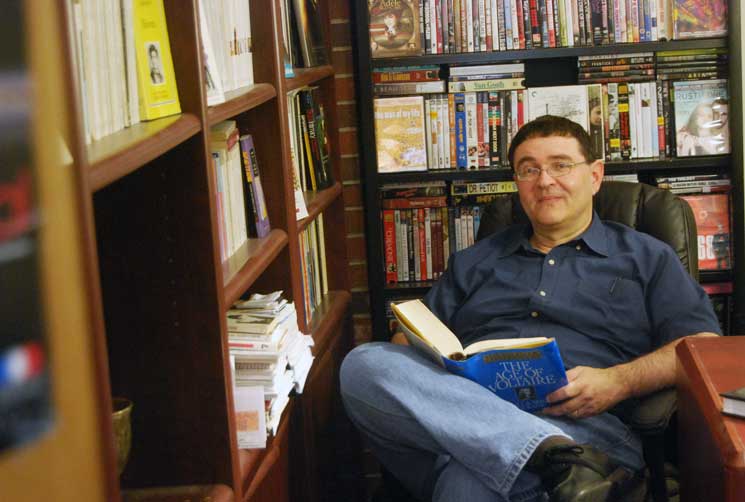Share this Story
Meet the Faculty: Dr. Alain Gabon
Professor never thought he'd live or teach in America; now he can't imagine a better way to appreciate both his native France and his newfound home
By Kristen De Deyn Kirk | January 9, 2013
 When Alain Gabon, Associate Professor of French at Virginia Wesleyan for 14 years, says he’s going to close his office door during an interview, one suspects he might be gearing up to say something controversial.
When Alain Gabon, Associate Professor of French at Virginia Wesleyan for 14 years, says he’s going to close his office door during an interview, one suspects he might be gearing up to say something controversial.
Maybe about religion? A woman’s role in the world? Politics in America?
After all, Dr. Gabon lectures and writes about these topics often. Recent publications include: "Egypt: The 5 Reasons of the Coup," published in August 2013 in Saphirnews; “Is Islamophobia Losing Ground in France?," published in November 2013 in Les Cahiers de l’Islam; and "The French Debates on Islamic Headscarves, the Republic, and Laïcité, scheduled for publication in 2014 in SITES: Contemporary French and Francophone Studies.” (And that’s just a partial list of his recent work.)
Early in his career, Gabon tended to tackle the less controversial topic of literature. Obviously, in recent years, he’s been drawn to more debatable concerns. While the topics of religion, gender and politics are loaded with opportunity for controversy, Gabon, born and raised in Dijon, France, couldn’t be more diplomatic when presenting his ideas.
While explaining his work on a new article, he presents the different views in Western Europe, Canada and the United States regarding individuals displaying religious symbols. In Western Europe, he notes as an example, individuals tend to “favor neutrality.”
“There are few spaces where public workers can express their religion [by wearing a religious symbol.] In French schools, all religious signs are banned. In America, that would never happen,” Dr. Gabon says. “In Canada, in Quebec, they are debating neutrality now and what should happen in both public and private spaces.”
He never hints which view he holds, or even which is more logical or reasoned in his opinion. Thinking about all of it is fun for him. It’s what makes him “happy,” he says.
“For me, there’s no difference between work and play because happiness comes from my work, being able to teach and write about all this.”
Gabon travels back to France each year, mainly to see family and friends, but also for intellectual stimulation.
“Seeing the differences and similarities between the countries gives me a sense of perspective and a lot to meditate on,” he says.
After travelling back and forth for more than 20 years, Gabon loves both countries. He’s glad he extended his stay in the States the first time he visited.
“I said I was coming for just one year, after having earned my bachelor’s in English and American literature and civilization from University of Dijon-Burgundy, and teaching in London,” he remembers. “I took some courses in America and then figured, well, it would be bad to do the courses and not get a degree.”
A year turned into a master’s in French studies from Miami University in Oxford, Ohio and a doctorate in French studies and film from University of Iowa.
Dr. Gabon’s passion for film continues in his teaching and writing today, especially contemporary films from the last few decades. He plans to write about the weighty topics he’s been working on recently, along with critiques on film and filmmaking.
“I love film for the richness and diversity it offers. It’s not just about entertainment, but a way to revisit moments of history and a tool to explore reality. I hope in the future to teach not only French film (along with his current course load of French language, culture and history) but also international, independent cinema as well.”


